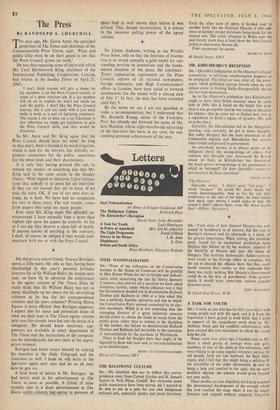The Press
By RANDOLPH S. CHURCHILL TEN days ago, Mr. Gavin Astor, the principal proprietor of The Times and chairman of the Commonwealth Press Union, said: 'Press and public alike must be on their guard to see that the Press Council grows no teeth.'
He was thus repeating some of the words which Mr. Cecil Harmsworth King, chairman of the International Publishing Corporation, Limited, had written in the Sunday Times on April 21, )963:
I don't think anyone will give a damn for lay members. I see the Press Council entirely in terms of a press relations job. If a lay member will sit on it, unpaid, he won't cut much ice with the public. I don't like the Press Council anyway, but if you are stuck with it you must make it work as a sort of lightning conductor. The reason 1 am so keen on a lay Chairman is that otherwise we might get legislation to give the Press Council teeth, and that would be disastrous.
So Mr. Astor and Mr. King agree that the Press Council should have `no teeth.' So long as they don't, there is bound to be much litigation, which is lush for the lawyers, but hellishly ex- pensive—sometimes for the public, sometimes for the press lords and their shareholders.
It is only fair, having pointed this out, to remind my readers of something else that Mr. King said in the same article in the Sunday Times: `With regard to intrusion, I give instruc- tions that nobody is to press for an interview. If they are not wanted they are to leave. If we miss the story, OK. If one of our men does in- trude, he is fired. We have had no complaints for two or three years. The real trouble conies from papers who send too many people.'
Ever since Mr. King made this splendid an- nouncement I have naturally kept a more than vigilant eye upon the papers he controls. As far as I can see they deserve a clean bill of health. If anyone knows of anything to the contrary, I shall, of course, be obliged if they would com- municate with me or with the Press Council.
My old private school friend, Terence Rattigan, seems a little naïve. He tells us that, having been blackballed in this year's personal birthday honours list of Sir William Haley, he intends next year, on June 10, to advertise the anniversary in the agony column of The Times. Does he really think that Sir William Haley has not as many blackballs up his sleeve for his advertising columns as he has for his correspondence columns and his news columns? Printing House Square is more efficient than Rattigan supposes. I expect that his saucy and premature boast of what we shall read in The Tittles agony column next year has already been fed into the brain of a computer. He should know electronic sup- pressors are available in every department of The Times and the instructions to the computer can be autom'atically fed into them at the appro- priate moment.
Rattigan had better insure himself by making his insertion in the Daily Telegraph and the Guardian as well. I hope he will write to the Spectator again next year and let us all hear how he gets on.
A final word of advice to Mr. Rattigan: he had better send in his advertisement to The Times as soon as possible. A friend of mine recently sent in a short advertisement to The Times agony column, but owing to pressure of space had to wait eleven days before it was printed. This, though inconvenient, is a tribute • to the immense pulling power of the agony column.
Sir Linton Andrews, writing in the World's Press News, tells us that the Institute of Journa- lists is to award annually a gold medal for out- standing services to journalism and the funda- mental freedom of the press. He continues: `Every organisation represented on the Press Council, editors of all national newspapers, foreign embassies, and High Commissioners' offices in London, have been asked to forward nominations for the medal with a closing date of July 1.' In fact, the date has been extended until July 9.
By the terms set out I am not qualified to make a recommendation; but I understand that Mr. Kenneth Young, editor of the Yorkshire Past, has already put forward the name of Mr. lain Macleod, whose eight-months-old editorship of the Spectator has been, in my view, the out- standing personal achievement of the year.






























 Previous page
Previous page